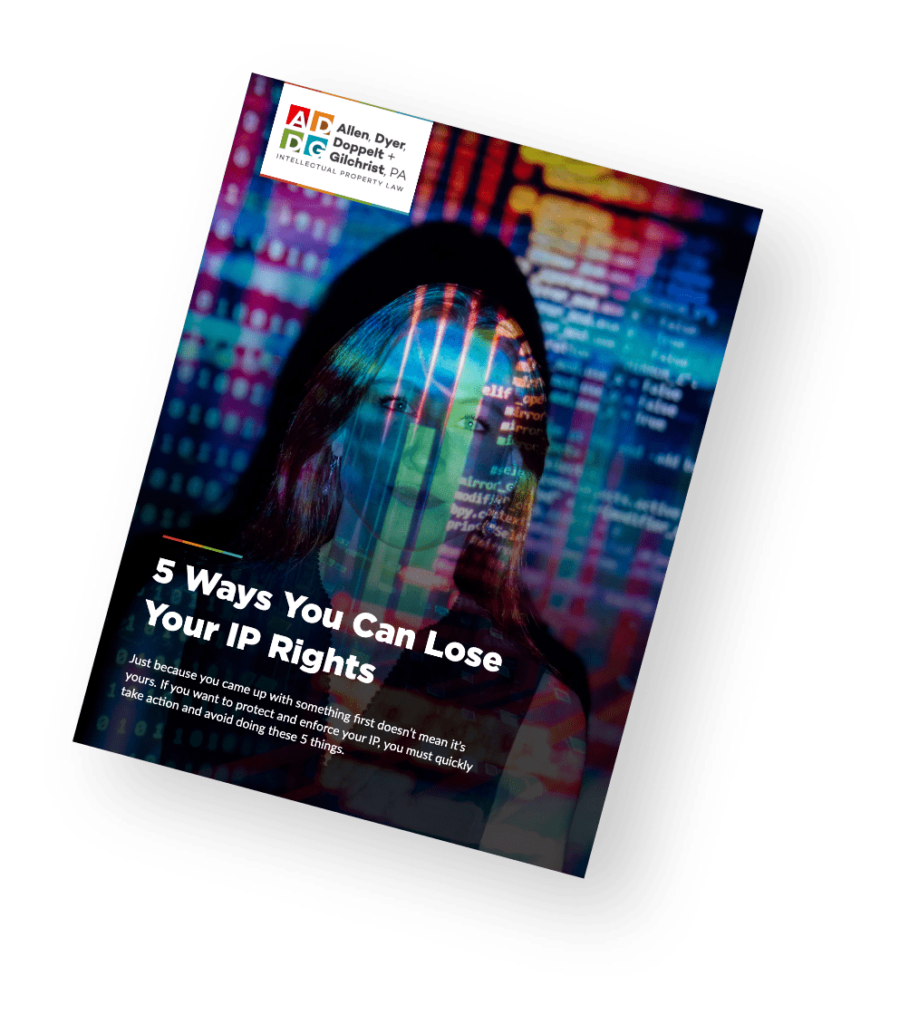Patents can be a key component of business strategy. As a business attorney, your clients may develop important innovations or designs that are essential to giving them a competitive edge. Knowing a few basic points of patent law can help you set your clients on the path to success, making sure these innovations are properly protected rather than lost due to a failure to take the right actions. Let’s talk about three points of patent law that business attorneys should know to help their clients avoid missteps, namely: (1) timing; (2) disclosure; and (3) inventorship.
1. Timing: When Should You Seek Patent Protection?
As soon as possible after an invention is conceived, businesses should evaluate filing for patent protection. The U.S. Patent and Trademark Office (USPTO) is a “first to file” system, meaning the first person or organization to file a patent application for an invention is typically granted the patent. Delaying filing a patent application can result in the loss of patent rights to another who files first.
Furthermore, filing dates determine what can be considered “prior art” to a patent application. Examination of a patent application by the USPTO involves, among other things, reviewing the claims of the application to determine whether the claims are novel and non-obvious over the prior art. Prior art may include not only patents and published patent applications, but also publicly available disclosures such as articles, catalogs, brochures, videos, etc. Whether such items qualify as prior art to a given patent application depends on the priority (filing) date of the application. Since new prior art is published every day, the longer you wait to file, the larger the potential universe of prior art will be.
Takeaway – encourage your clients to file patent applications as soon as possible.
2. Disclosure: When Is It OK To Talk With Others About An Invention?
It’s also crucial to know that disclosing an invention to the public before filing a patent application can affect the ability to obtain a patent. More particularly, in the U.S., disclosures of an invention made more than one year before the effective filing date of a claimed invention forfeit the invention to the public domain, meaning that the inventor is no longer able to obtain patent protection for the invention. Furthermore, most foreign jurisdictions do not have such a one-year grace period, and public disclosure of an invention will immediately forfeit patent rights in such “absolute novelty” jurisdictions.
It should also be noted that a non-public disclosure, e.g., a private disclosure made under an obligation of confidentiality (such as a non-disclosure agreement) may also qualify as a “prior art” event in the U.S. That is, if the disclosure amounts to an offer for sale of the invention, this disclosure may still begin the one-year grace period, after which a patent cannot be obtained.
That is not to say that a company or inventor cannot discuss an invention with a prospective investor or consultant that is to help develop the invention. If done under an obligation of confidentiality, these types of disclosures generally do not create a prior art event. However, read on to see why any such disclosures should still be done with extreme caution.
Takeaway – encourage your clients not to publicly disclose or offer for sale an invention before filing for patent protection.
3. Inventorship: What Rights Do Inventors/Patent Owners Have?
A patent gives its owner(s) the right to exclude others from making, using, selling, and importing the patented invention for a limited period of time. By default, each of the inventors named on a patent is a 100% joint owner entitled to do whatever he or she wants with the patent, without having to account to the other owners. For example, one joint owner could license a patent to a third party without permission from or accounting to any other owners. This default ownership arrangement is problematic at best and typically untenable, which is why most inventions are assigned to a company (either jointly owned by the inventors or by the company the inventors work for) that controls the use and disposition of the patent.
Inventorship is determined based upon who contributes to the subject matter of each claim in the patent application. The USPTO requires that if someone contributes to the subject matter of any claim in the application that this person must be named as an inventor. So, circling back to point (2) about disclosure, working with a consultant or potential joint venture partner can be problematic when engineers or other problem solvers get together and start talking about new designs. Often, such joint collaboration can result in inventors from both parties. Having your clients file for patent protection before any such collaborations occur with another party helps establish that all of the fundamental or basic components of the invention were created in-house, and are therefore not subject to joint ownership with some other entity.
Takeaway – encourage your clients to file for patent protection before engaging third party investors or partners to help avoid creating co-inventors outside of the client’s organization.
How Business Attorneys Can Play a Key Role in Protecting Their Client’s Intellectual Assets
As a business attorney, you are a trusted advisor to your clients and often touch point for all of their legal matters, whether those matters are “in your wheelhouse” or not. Knowing the above points about patent law will put you in the best position to recognize when potential timing, disclosure, or inventorship issues are likely to occur. In turn, you will know when it is appropriate to connect the client with the right patent attorneys to ensure all innovations are properly protected.
At ADD+G, our experienced team of patent attorneys is here to partner with you to answer any questions and make sure your clients’ most valuable assets are protected.
Contact us today!
About the Author
John Woodson is a Registered Patent Attorney who practices in the area of patent prosecution, patent infringement studies, and client counseling.

Share This



